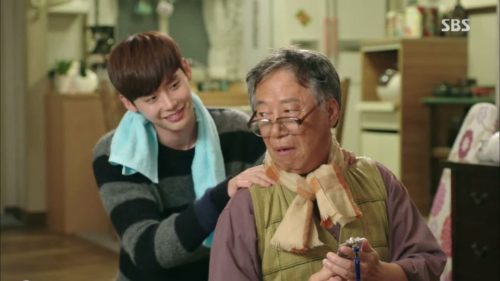K-drama review: Pinocchio

I enjoyed this K-drama far more than I expected to. Pinocchio (SBS 2014–2015), as the title suggests, is a loose interpretation of the classic fairy tale, but grounded in reality. And it’s also an examination of TV news reporting, asking tough questions about truth and other values in journalism.
All the essential ingredients of the fairy tale are there: a person who displays a physical manifestation of lying (in this case hiccups); a person close to them who acts as a conscience; dead and absent parents; there’s even (in my interpretation) a fairy godparent role.
And yet for all that, the TV show this most resembles is Doctors – right down to its lead actor Park Shin-hye. Here she plays Choi In-ha, a woman who has Pinocchio syndrome – she hiccups when she lies (or, importantly, believes herself to be lying or supporting someone else’s lie). Just like in Doctors, the first two episodes are flashbacks setting up the dramatic and romantic storylines.
In 2000, we meet the Ki family. Father Ho-sang is a chief firefighter in a Seoul suburb with a wife and two sons, Jae-myeong, who is 17, and Ha-myeong (who I later figured out is meant to be 13 or 14 but the actor looks about 10). In a horrific fire at a waste-disposal plant, his whole crew dies but Ho-sang’s body is not recovered. This leads the media to speculate that he has run away because he is guilty of making a poor decision that sent several men to their deaths. The media coverage targeting the Ki family gets frenzied, and destroys them, and Ha-myeong is last seen on a clifftop with his mother.
Several months later, on the small island Hyangri, we meet Choi In-ha (aged about 13) and her father, who have come to live with her grandfather Choi Gong-pil (Byun Hee-bong – who you might recognise from Okja) following her parents’ divorce. They are disconcerted to discover that Gong-pil has adopted a son In-ha’s age, who has been renamed Choi Dal-po after Gong-pil’s long-dead firstborn. Dal-po was rescued by the old man from drowning and claims to have no memory of his life before, but if he is lying, he is also clearly devoted to his new father.
Dal-po is of course the missing Ki Ha-myeong and starting over with a new name in a new town suits him perfectly. But In-ha’s mother is Song Cha-ok (Jin Kyung, who also played the lead’s mum in Uncontrollably Fond) – the very TV reporter who hounded his family especially hard – and In-ha worships her absent mother.

The main part of the series begins in 2013. The Choi family have moved to Seoul. In-ha has spent five years trying to get a job as a reporter, but no-one will hire a Pinocchio for that role. Dal-po (now played by Lee Jong-suk) is working as a taxi driver and is still hating on all media. He makes a deal with In-ha that they will both apply for an internship. If he, with no relevant qualifications, can get the job while she, with a media degree, can’t, then it’s time that she gives up on this pipe dream.
They end up both getting internships at rival TV companies. In-ha at MSC – the company where her mother is the news anchor, notorious for chasing ratings – and Dal-po at YBS, which prides itself on integrity and high standards (but of course drools over MSC’s audience figures). Cue lots of camping out at Hangang police station with the other trainees hunting stories, lots of harassed phone calls with their superiors, and cub reporter assignments such as filming people slipping on ice. But there are big stories too, and of course revelations about Dal-po’s previous life.
The blossoming romance between In-ha and Dal-po is super awkward if you think too hard about it, because they are uncle and niece (not by blood but by legal adoption) and even though they are the same age, having been raised together since they were 13/14 does make them close family however you look at it. But actors Park and Lee have such good chemistry – and the drama frequently acknowledges the weird situation – so I got over it pretty quickly.
The romance, friendships and family relationships are all very sweet. Most characters have a nice development arc over the 20 episodes, and nothing is black and white. There was lots of intense speech-making about the point of journalism and the nature of truth, and quite a lot of high drama moments. But there were also those slow scenes of bonding over a bowl of noodles that I love these dramas for.
This show isn’t perfect. Some elements of the premise do require a certain suspense of disbelief. But on the scale of misogynist to feminist, this is nearer the preferred end of the scale. In-ha and Dal-po are equals in money, power and position. And they’re both attractive and good actors, which helps. The show also does a good job of balancing the suspense and minutiae of crime reporting with all the personal relationship stuff.